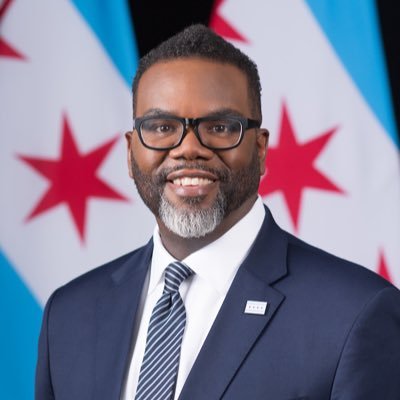Chicago Mayor Asserts Authority Against Trump’s Federal Intervention
Facing potential federal intervention orchestrated by President Donald Trump, Chicago Mayor Brandon Johnson took assertive action this past Saturday. The mayor, belonging to the Democratic Party, signed an executive order he believes would help resist the anticipated federal overreach. According to Johnson, it was necessary to initiate immediate, bold measures to safeguard the city’s residents. This response was in reaction to Trump’s threats of deploying federal forces and the National Guard to the state of Illinois.
Johnson laid emphasis on the executive order’s key components during a news conference. The order primarily instructs the city’s legal department to employ all available and appropriate legal processes to counter Trump’s prospective strategy. The essence was that the city would not refrain from using any effective tool, inclusive of legal action, to preserve its autonomy. Johnson pitched this as an assertion of necessary checks and balances in these challenging times.
Beyond the use of legal instruments against federal encroachment, the executive order contained other significant directives. Specifically, it delineates permissible actions for Chicago police officers interacting with federal agencies and restricts them from hiding their identities or police insignia. With these clear guidelines, the order aims to uphold transparency and accountability among Chicago’s ranks.
The mayor unambiguously stated that the Chicago Police Department (CPD) would not cooperate with military entities in regular police duties or immigration enforcement. Johnson expressed his view that integrating federal forces into local affairs should not deviate the CPD from their primary duties like tackling crime. He asserted that policing traffic and overseeing checkpoints should remain outside their purview and should not be commissioned by the president.
This decree has emerged in the midst of the president exerting military might in Washington, D.C. Furthermore, Trump eyed other major cities, including Baltimore, for similar measures. Evidently, Johnson’s move aligns with the broader pushback from Democratic officials against the potential militarization of American cities.
Encapsulating this sentiment, numerous Democratic governors publicly rebuked Trump’s activities. They expressed concern over potential deployments of a state’s National Guard without the requisite approval from state governors. The consensus was that such an intervention infringes on states’ rights, is unproductive, and detracts from the mission of service members.
One major city that had witnessed the federal surge firsthand was Washington, D.C. Its Mayor, Muriel Bowser, acknowledged a decrease in crime but criticized the effectiveness of involving immigration officers and national troops in local security. Bowser argued that such intrusive federal involvement strained community relationships with local law enforcement and proclaimed it as unhelpful.
Bowser additionally stated her opposition to disguise ICE agents interacting with the public. She underlined the inefficiencies of deploying National Guard units from various states to Washington. Bowser concluded by arguing that such federal intrusions did little to better manage their resources or improve public safety.
Johnson, in his press conference, addressed his concerns about potential federal intervention in Chicago. He highlighted credible intelligence indicating an imminent, militarized presence in the city. The specifics of this intervention remained uncertain, and the city could ostensibly face various forms of military enforcement, including immigration enforcement or National Guard deployment.
White House spokesperson, Abigail Jackson, dismissed Johnson’s assertive stance, calling it ‘Trump derangement syndrome.’ Jackson suggested that efforts to control crime would yield better results if local Democrats focused on their own cities, rather than trying to politicize crime control. Jackson criticized Johnson and others for exploiting controversial issues for perceived political points.
As the discourse evolved, Tom Homan, Trump’s border czar, announced on Fox News that federal action in Chicago was under examination. Homan further targeted other sanctuary cities, arguing for federal focus as these cities were likely ‘problems.’ These were strong indications of the incoming federal intervention at the local level.
Homan confidently asserted that the administration would act regardless of potential resistance from local officials. He hinted at a brisk federal approach to crime control, regardless of local cooperation. Clearly, there was growing tension between federal and local authorities over the proposed federal overreach into local law enforcement.
So far, the president’s crime-fighting plan included enforcement officers and National Guard troops deployment only to Washington. There were also instances of opposition from governors such as California’s Gov. Gavin Newsom, who resisted Trump’s move to federalize the local National Guard and send troops to Los Angeles. Despite such resistance, the troops were ultimately dispatched to manage protests against the administration’s immigration regulations.
During a public event in Wisconsin, Vice President JD Vance shared his perspective on these deployments. While acknowledging that different cities had distinct public safety needs, he argued that the president simply offered assistance. He also suggested contingency for federal aid in cities where governors and mayors seemed unwilling to accept it.
Vance also mentioned Chicago during his talk, emphasizing its struggle with crime, and expressing confusion about local leaders’ hostility toward receiving federal aid. He suggested that the fury against Trump’s offer seemed disproportionate compared to the distress over local crime rates.
Vance further elaborated that states’ acceptance of federal help was a matter of choice. He insisted that the president had no intention to force federal troops upon reluctant states. Vance surmised this by challenging local leaders to invite federal aid for bolstering local law enforcement.



